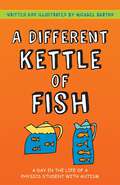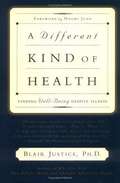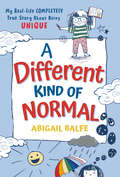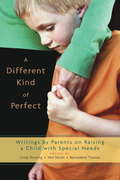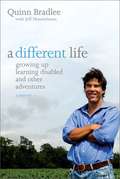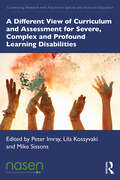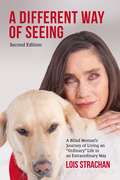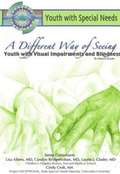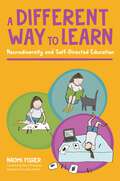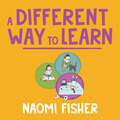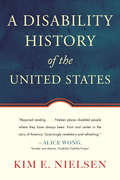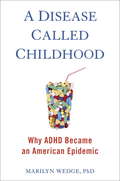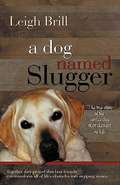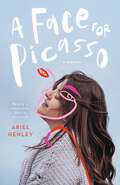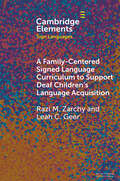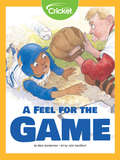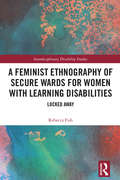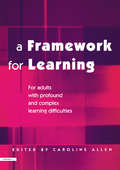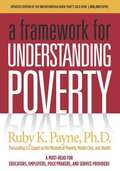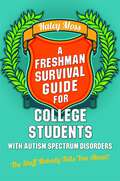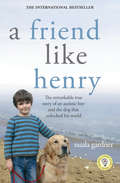- Table View
- List View
A Day at the Beach: A Grammar Tales Book to Support Grammar and Language Development in Children (Grammar Tales)
by Jessica HabibPete, Jem and Belle are enjoying a day at the beach until the weather turns stormy. Targeting Subject-Verb-Object sentences and early adjectives, this book provides repeated examples of early developing syntax and morphology which will engage and excite the reader while building pre-literacy skills and make learning fun, as well as exposing children to multiple models of the target grammar form. Perfect for a speech and language therapy session, this book is an ideal starting point for targeting client goals and can also be enjoyed at school or home to reinforce what has been taught in the therapy session.
A Day to Cry
by Mary GrigarMary Grigar wasn't diagnosed with dyslexia until she was an adult, after the death of her handicapped 8-year-old son. She tells her story to Louise Hullinger, who helps her write this memoir.
A Diamond in the Darkness
by Veni RajThen one day Bahá'í teachers came to his village with a Great Message and things began to happen not only for the village but for Liaz as well. This true and inspiring story, generously illustrated by Tushar Kanti-Paul, will be enjoyed by children, youth and adults, as well.
A Different Kettle of Fish: A Day in the Life of a Physics Student with Autism
by Michael Barton Delia Barton"I'm looking at the Solar System display when I hear a child close by shouting at his mum, to which she replies 'No need to bite my head off!' I've heard of laughing your head off (to laugh a lot) and even biting your tongue (to be quiet) but biting someone's head off puts a rather more vivid picture into my mind!" During a trip to London, taking in tube announcements, guitar shops, and the Science Museum Michael Barton explores and explains the confusing "neurotypical" world of contradictory signage, hidden meanings and nonsensical figures of speech. His quirky and comic illustrations bring to life the journey from the comfort of his familiar university surroundings into the hectic bustle of central London. A fun and enlightening read for friends, family, caring professionals and anyone interested in an alternative viewpoint on the world. Sure to "strike a chord" with other day trippers on the autism spectrum.
A Different Kind of Health: Finding Well-Being Despite Illness
by Blair JusticeIn this book, Blair Justice, Ph.D., a Professor of Psychology, draws on his own research as well as other findings from both scientific and spiritual literature to present the ways that such people can "get out of themselves" and transcend pain and distress. In doing so, they find a core health deeper than the physical. Along with telling the moving stories of people with this different kind of health, the book gives evidence on how those with chronic illness or physical impairment, though "sick" by medical standards, can experience themselves as "well, " based on the deeper sense of well-being they achieve. Dr. Justice, who is among the "sick but well himself, clearly explains a wide spectrum of useful health-related findings, including how the sick but well get beyond their illness and pain by identifying with something bigger than themselves and their problem; what five ways there are to find a subjective health and an abiding sense that life is good despite pain and illness; how getting rid of old conflicts, hurts, and anger relieves physical pain; why subjective health - one's own sense of well-being despite physical infirmity - is a more powerful predictor of longevity and quality of life than are physical examinations by a doctor and laboratory tests; how finding some benefit or value in adversity positively affects the cardiovascular and immune systems as well as makes life better; and why religion is protective for the chronically ill and injured by reducing the risks of becoming disabled.
A Different Kind of Normal: My Real-Life COMPLETELY True Story About Being Unique
by Abigail BalfeIn this joyfully illustrated memoir, author-illustrator Abigail Balfe recounts her journey growing up autistic and the challenges of navigating the "normal" world around her.Hi! My name is Abigail, and I'm autistic. But I didn't know I was autistic until I was (kind of) an adult. This is my true story of growing up in the confusing "normal" world, all the while missing some Very Important Information about myself. There'll be scary moments involving toilets and crowded trains, heartwarming tales of cats and pianos, and funny memories including my dad and a mysterious tub of ice cream. Along the way, you'll also find some Very Crucial Information about autism. Important, funny, and completely unique, this book is for anyone who has ever felt different.
A Different Kind of Perfect: Writings by Parents on Raising a Child with Special Needs
by Cindy Dowling Bernadette Thomas Neil NicollEvery parent dreams of having a happy, healthy child. What happens when these dreams are shattered by a physical or cognitive disability? A Different Kind of Perfect offers comfort, consolation, and wisdom from parents who have been there--and are finding their way through.The writings collected here are grouped into chapters reflecting the progressive stages of many parents' emotional journeys, starting with grief, denial, and anger and moving towards acceptance, empowerment, laughter, and even joy. Each chapter opens with an introduction by Neil Nicoll, a child and family psychologist who specializes in development disorders.
A Different Life: Growing Up Learning Disabled and Other Adventures
by Quinn Bradlee Jeff HimmelmanBorn with a hole in his heart that required invasive surgery when he was only three months old, Quinn Bradlee suffered from a battery of illnesses: seizures, migraines, fevers from an early age. But it wasn't until he was fourteen that Bradlee was correctly diagnosed with Velo-Cardio-Facial Syndrome (VCFS), a widespread, little-understood disorder that is expressed through a wide range of physical ailments and learning disabilities. Ten percent of the population is affected by a learning disability, but few of us understand what being learning disabled (LD) is really like. In this funny, moving, and often irreverent book, Bradlee tells his own inspirational story of growing up as an LD kid and of doing so as the child of larger-than-life, formidably accomplished parents: long-time Washington Post executive editor Ben Bradlee and bestselling author Sally Quinn. From his difficulties reading social cues, to his cringe-worthy loss of sexual innocence, Bradlee describes the challenges and joys of living "a different life" with disarming candor and humor. By the end of A Different Life he will have become, if not your best friend, one of your favorite people.
A Different View of Curriculum and Assessment for Severe, Complex and Profound Learning Disabilities (Connecting Research with Practice in Special and Inclusive Education)
by Peter Imray Lila Kossyvaki Mike SissonsA Different View of Curriculum and Assessment links a theoretical pedagogical model with a sympathetic practical model of curriculum and assessment difference for those with PMLD, CLD and SLD. Split into two parts, this accessible resource combines theoretical explanations with first-hand accounts of how this works in educational establishments, through the analysis of evidence-based practice carried out in a number of English special (specialist) schools. The expert authors challenge the notion that a national, or common core standards, curriculum, however expertly differentiated, is fit-for-purpose for the PMLD, CLD and SLD populations in any country. A Different View offers cogent and reasoned arguments for considering that irrespective of age, such learners learn differently to their neuro-typical, conventionally developing peers. If they learn differently, this book shows how we should be teaching them differently. Reflecting the centrality of process over product, this book will clearly explain how each individual learner might be enabled and facilitated to become the best they can be and do the best they can do, in order to fully realise their potential as equal and independent citizens.
A Different Way of Seeing: A Blind Woman's Journey Of Living An Ordinary Life In An Extraordinary Way
by Lois StrachanEndorsed by the South African National Council for the Blind, and the South African Guide-Dogs Association for the Blind. Have you ever wondered how a blind person pours a cup of coffee? Or how they and their guide dog know when it’s safe to cross a busy road? When Lois Strachan lost her sight at the age of 21 years, she had to learn the answers to these and countless other questions of how to live as a blind person in a sighted world. In this delightfully quirky and entertaining book, Lois shares some of the secrets she discovered about how to live an "ordinary" life in an extraordinary way despite her blindness.
A Different Way of Seeing: Youth with Visual Impairments and Blindness (Youth With Special Needs)
by Patricia SouderKyla passed the ball to her teammate, then raced up the court. Somehow, she lost track of the orange globe and didn't see it again until right before it smashed into her left cheek. Kyla's head snapped. At courtside, a paramedic asked her to close her left eye and see with her right. "How's everything look?" "Just fine." The paramedic instructed her to close her right eye and look with her left. "How about now?" "I see bright, flashing lights, some black specks, and a dark cloud right where you should be." "In that case, you win some eye shields and a trip to the emergency room." In A Different Way of Seeing: Youth with Visual Impairments and Blindness, you will learn about many different visual disorders, what can cause them, and resources to help deal with the challenges visual impairments can bring. As you follow Kyla's story, you will learn what it is like to be visually impaired. Along the way, you will also learn about the resources and adaptive devices - like white canes, guide dogs, Braille, blind camps, music programs, and sports opportunities - available to help youth with blindness or vision impairment. People with vision impairments have many stories to tell - stories of determination, hope, and accomplishment.
A Different Way to Learn: Neurodiversity and Self-Directed Education
by Naomi Fisher'If you are a parent worrying whether self-directed education will work for your child, because you have been told that they have special needs which can only be met in the school system - think again'Neurodivergent children experience and interact with the world differently to many of their peers. Standard educational systems often fail to adapt to their unique strengths and ways of learning. School, and even the act of learning, can become a source of great anxiety and trauma. Self-directed education offers an alternative to traditional schools that can help neurodivergent children develop at their own pace and thrive.Blending theory, practical advice and lived experience, clinical psychologist Naomi Fisher introduces the world of self-directed learning and tailoring the learning environment to your child.This comprehensive overview of self-directed learning is packed with ideas on how to implement it at home and includes interviews from parents of neurodivergent children on how you can make learning differently work for you and your child
A Different Way to Learn: Neurodiversity and Self-Directed Education
by Naomi Fisher'If you are a parent worrying whether self-directed education will work for your child, because you have been told that they have special needs which can only be met in the school system - think again'Neurodivergent children experience and interact with the world differently to many of their peers. Standard educational systems often fail to adapt to their unique strengths and ways of learning. School, and even the act of learning, can become a source of great anxiety and trauma. Self-directed education offers an alternative to traditional schools that can help neurodivergent children develop at their own pace and thrive.Blending theory, practical advice and lived experience, clinical psychologist Naomi Fisher introduces the world of self-directed learning and tailoring the learning environment to your child.This comprehensive overview of self-directed learning is packed with ideas on how to implement it at home and includes interviews from parents of neurodivergent children on how you can make learning differently work for you and your child
A Disability History of the United States (REVISIONING HISTORY #2)
by Kim E. NielsenThe first book to cover the entirety of disability history, from pre-1492 to the present <P><P>By placing the experiences of people with disabilities at the center of the American story, A Disability History of the United States fundamentally reinterprets how we view our nation's past. Throughout the book Kim Nielsen illustrates how concepts of disability have deeply shaped the American experience--from deciding who was allowed to immigrate to establishing labor laws and justifying slavery and gender discrimination. <P><P>The book abounds with compelling stories pulled from primary documents and social histories to retell American history through the eyes, words, and impressions of the people who lived it. Included are absorbing--at times horrific--narratives of blinded slaves being thrown overboard and women being involuntarily sterilized, as well as triumphant accounts of miners organizing strikes and disability rights activists marching on Washington. <P><P>Engrossing and revelatory, A Disability History of the United States reconstructs our nation's story--from a narrow master narrative to a shared history that encompasses us all. As Kim Nielsen writes, disability is "our story, the story of someone we love, the story of whom we may become, and it is undoubtedly the story of our nation."
A Disease Called Childhood
by Marilyn WedgeA surprising new look at the rise of ADHD in America, arguing for a better paradigm for diagnosing and treating our children In 1987, only 3 percent of American children were diagnosed with attention-deficit/hyperactivity disorder, also known as ADHD. By 2000, that number jumped to 7 percent, and in 2014 the number rose to an alarming 11 percent. To combat the disorder, two thirds of these children, some as young as three years old, are prescribed powerful stimulant drugs like Ritalin and Adderall to help them cope with symptoms. Meanwhile, ADHD rates have remained relatively low in other countries such as France, Finland, and the United Kingdom, and Japan, where the number of children diagnosed with and medicated for ADHD is a measly 1 percent or less. Alarmed by this trend, family therapist Marilyn Wedge set out to understand how ADHD became an American epidemic. If ADHD were a true biological disorder of the brain, why was the rate of diagnosis so much higher in America than it was abroad? Was a child's inattention or hyperactivity indicative of a genetic defect, or was it merely the expression of normal behavior or a reaction to stress? Most important, were there alternative treatments that could help children thrive without resorting to powerful prescription drugs? In an effort to answer these questions, Wedge published an article in Psychology Today entitled "Why French Kids Don't Have ADHD" in which she argued that different approaches to therapy, parenting, diet, and education may explain why rates of ADHD are so much lower in other countries.In A Disease Called Childhood, Wedge examines how myriad factors have come together, resulting in a generation addictied to stimulant drugs, and a medical system that encourages diagnosis instead of seeking other solutions. Writing with empathy and dogged determination to help parents and children struggling with an ADHD diagnosis, Wedge draws on her decades of experience, as well as up-to-date research, to offer a new perspective on ADHD. Instead of focusing only on treating symptoms, she looks at the various potential causes of hyperactivity and inattention in children and examines behavioral and environmental, as opposed to strictly biological, treatments that have been proven to help. In the process, Wedge offers parents, teachers, doctors, and therapists a new paradigm for child mental health--and a better, happier, and less medicated future for American children
A Dog Named Slugger: The True Story of the Friend Who Changed My World
by Leigh BrillThe true life story of a dog who changed everything for one woman. For the first time in my life, I didn't need to pretend, I didn't need to be tough: I only needed to be honest. "I have cerebral palsy. I walk funny and my balance is bad. I fall a lot. My hands shake, too. That means I'm not so good at carrying things. And if I drop stuff, sometimes it's hard to just bend down and get it." I waited anxiously for the interviewer's response. She smiled. "It sounds like a service dog could be great for you." So began Leigh Brill's journey toward independence and confidence, all thanks to a trained companion dog named Slugger. The struggling college student and the Labrador with a "a coat like sunshine" and a tail that never stopped wagging became an instant team. Together, they transformed a challenge into a triumph. Together, they inspired and educated everyone they met. Now, Leigh honors her friend with the story of their life, together.
A Dog to Trust: The Saga of a Seeing-Eye Dog
by Joseph E. ChipperfieldTells the story of Arno, an Alsatian dog also known as a German Shepherd Dog, who was trained as the eyes of Ralph, a painter who loses his sight, and in a twist of fate, Arno becomes blind and Ralph becomes his eyes.
A Face for Picasso: Coming of Age with Crouzon Syndrome
by Ariel HenleyA Schneider Family Book Award Honor Book for Teens"Raw and unflinching . . . A must-read!" --Marieke Nijkamp, #1 New York Times-bestselling author of This Is Where It Ends"[It] cuts to the heart of our bogus ideas of beauty." –Scott Westerfeld, #1 New York Times-bestselling author of Uglies I am ugly. There's a mathematical equation to prove it.At only eight months old, identical twin sisters Ariel and Zan were diagnosed with Crouzon syndrome -- a rare condition where the bones in the head fuse prematurely. They were the first twins known to survive it.Growing up, Ariel and her sister endured numerous appearance-altering procedures. Surgeons would break the bones in their heads and faces to make room for their growing organs. While the physical aspect of their condition was painful, it was nothing compared to the emotional toll of navigating life with a facial disfigurement.Ariel explores beauty and identity in her young-adult memoir about resilience, sisterhood, and the strength it takes to put your life, and yourself, back together time and time again.
A Family-Centered Signed Language Curriculum to Support Deaf Children's Language Acquisition (Elements in Sign Languages)
by Razi M. Zarchy Leah C. GeerDeaf children experience language deprivation at alarmingly high rates. One contributing factor is that most are born to non-signing hearing parents who face insurmountable barriers to learning a signed language. This Element presents a case for developing signed language curricula for hearing families with deaf children that are family-centered and focus on child-directed language. Core vocabulary, functional sentences, and facilitative language techniques centered around common daily routines allow families to apply what they learn immediately. Additionally, Deaf Community Cultural Wealth (DCCW) lessons build families' capacity to navigate the new terrain of raising a deaf child. If early intervention programs serving the families of young deaf children incorporate this type of curriculum into their service delivery, survey data suggest that it is both effective and approachable for this target population, so the rates of language deprivation may decline.
A Feel for the Game
by John Sandford Myra SandermanCorey plays a special role on his baseball team—he’s their first deaf player! He and the coach communicate on the field by using sign language. Will Corey help the Northfield Huskies win the game and go on to the championship?
A Feminist Ethnography of Secure Wards for Women with Learning Disabilities: Locked Away (Interdisciplinary Disability Studies)
by Rebecca FishWhat is life like for women with learning disabilities detained in a secure unit? This book presents a unique ethnographic study conducted in a contemporary institution in England. Rebecca Fish takes an interdisciplinary approach, drawing on both the social model of disability and intersectional feminist methodology, to explore the reasons why the women were placed in the unit, as well their experiences of day-to-day life as played out through relationships with staff and other residents. She raises important questions about the purpose of such units and the services they offer. Through making the women’s voices heard, this book presents their experiences and unique perspectives on topics such as seclusion, restraint, and resistance. Exploring how the ever present power disparity works to regulate women’s behaviour, the book shows how institutional responses replicate women’s bad experiences from the past, and how women’s responses are seen as pathological. It demonstrates that women are not passive recipients of care, but shape their own identity and futures, sometimes by resisting the norms expected of them (within allowed limits) and sometimes by transgressing the rules. These insights thus challenge traditional institutional accounts of gender, learning disability and deviance and highlight areas for reform in policy, practice, methodology, and social theory. This ground-breaking book will be of interest to scholars, students, policymakers and advocates working in the fields of learning disability and disability studies more widely, gender studies and sociology.
A Framework for Learning: For Adults with Profound and Complex Learning Difficulties
by Caroline AllenThis book offers carers, practitioners and managers a tried and tested structure for enabling adults with a range of complex needs to develop their individual skills and experience. It also provides a flexible framework which is suitable for specialist colleges and training centers for people with learning difficulties.
A Framework for Understanding Poverty (4th Revised Edition)
by Ruby K. PayneThis book presents the issues central to teaching students from poverty, then takes a pivotal next step by offering proven tools educators can use immediately to improve the quality of instruction in their classrooms.
A Freshman Survival Guide for College Students with Autism Spectrum Disorders: The Stuff Nobody Tells You About!
by Susan J. Moreno Haley MossHow do you know which college is right for you? What happens if you don't get on with your roommate? And what on earth is the Greek system all about? As a university student with High-Functioning Autism, Haley Moss offers essential tips and advice in this insider's guide to surviving the Freshman year of college. Chatty, honest and full of really useful information, Haley's first-hand account of the college experience covers everything students with Autism Spectrum Disorders need to know. She talks through getting ready for college, dorm life and living away from parents, what to expect from classes, professors and exams, and how to cope in new social situations and make friends. This book is a must-read for all students on the autism spectrum who are about to begin their first year of college, parents and teachers who are helping them prepare, and college faculty and staff.
A Friend Like Henry
by Nuala GardnerNow a New York Times Bestseller!"The incredible story of a family with an autistic son, Dale, who conquers his disability thanks to the special bond he forms with Henry, a golden retriever puppy ... This is a fascinating and inspiring real-life account."-Woman & HomeA Friend Like Henry: The remarkable true story of an autistic boy and the dog that unlocked his world When Jamie and Nuala Gardner chose a puppy for their son, Dale, they weren't an ordinary family choosing an ordinary pet. Dale's autism was so severe that the smallest deviation from his routine could provoke a terrifying tantrum. Family life was almost destroyed by his condition, and his parents spent most of their waking hours trying to break into their son's autistic world and give him the help he so desperately needed. But after years of constant effort and slow progress, the Gardners' lives were transformed when they welcomed a new member into the family, Henry, a gorgeous golden retriever puppy. The bond between Dale and his dog would change their lives ..."This touching story is an emotional rollercoaster." -Book Review"Emotionally charged, this is a story that raises powerful issues in a deeply personal and insightful manner." -Irish Examiner


